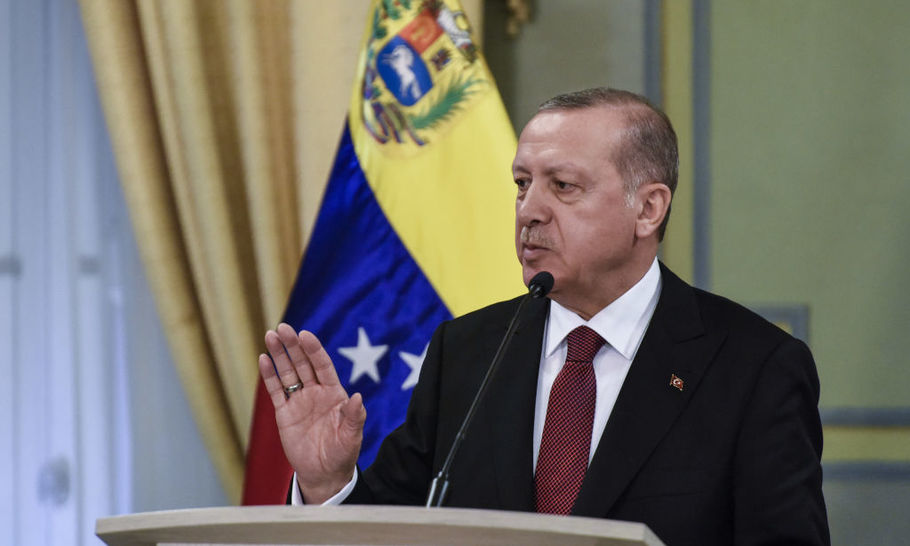The attack on Muslims in New Zealand has played into the hands of President Erdogan

Carlos Becerra/Bloomberg via Getty Images
Lest we forget that there are more intractable problems than Brexit, the Turkish leader has just given us a stark reminder of the potential for hostility between Islam and the West. President Erdogan is deliberately firing up his 80 million compatriots with a toxic mixture of distorted history, demonisation and demagogy.
At election rallies in Turkey, Recep Tayyip Erdogan has shown footage of the massacre in Christchurch, New Zealand, in which 50 Muslims died — filmed by the man who is accused of their murder. Now, exploiting Turkey’s annual commemoration of the Gallipoli campaign in World War I, he has delivered a bloodcurdling warning to Australians and New Zealanders: “Your grandparents came [and] some of them returned in coffins. If you come as well, like your grandfathers, be sure that you will be gone like your grandfathers.”
Following the discovery that the Australian accused of the massacre, Brenton Tarrant, had visited Turkey, Erdogan fuelled the conspiracy theories that swirl around the Muslim world: “This is not an individual attack, it is organised,” he told the crowds. “The enemies of Muslims have shown that they continue to hate us.”
Tarrant is a white supremacist with no known religious beliefs who is reported to admire Communist China, a regime that persecuted both Muslims and Christians. Yet Erdogan accuses the Western media of double standards because they do not refer to him as a “Christian terrorist”. The Muslims who died in the attack were citizens of New Zealand, but the Turkish President poses as the protector of Muslims everywhere. In reality, he has a long record of inciting hatred of the West, where millions of Muslims of Turkish origin live and work.
More than a decade ago, when he was still Prime Minister rather than executive President of Turkey and enjoyed a reputation as a “moderate Islamist”, Erdogan came to Oxford to give a speech. Afterwards, I asked him what the phrase meant. Wasn’t it an oxymoron? Replying in Turkish, Erdogan did not mince his words: “There is no such thing as ‘moderate’ Islam. There is only one Islam. Only you in the West think in these terms.”
Since then, Erdogan has provoked confrontations with Germany and The Netherlands over the Turkish diaspora there, with Israel over the Palestinians, and with the United States over Syria and the Kurds. Since the failed coup against him in 2016, around which he has also peddled conspiracy theories, Erdogan has become increasingly authoritarian and has all but extinguished the free press in Turkey.
In recent months he has aligned Turkish foreign policy with Russia and Iran, buying weapons from the former and carving up Syria with the latter. Turkey’s record on human rights has been so bad that EU membership is no longer feasible, but in any case Erdogan is evidently no longer interested. His foreign policy seems to be driven by a combination of resentment against the West and Islamic imperialism in the East.
Rather than following the pro-Western secular nationalism of Kemal Atatürk, the founder of modern Turkey, Erdogan conjures up nostalgia for the Ottoman Empire. Even more ominously, he appears to hanker after the Caliphate that Atatürk abolished in 1924. Openly competing with the Saudi monarchs, who claim to be the guardians of the holy places, Erdogan presents himself as the pre-eminent global Muslim champion, reaching out to Sunni communities but also building bridges with Shia Muslims who look to Iran.
So the latest attack on Muslims in New Zealand has played into the hands of the Turkish leader. Evoking memories of the ANZAC forces who spearheaded the landings in Gallipoli, suffering severe casualties that are still a sensitive issue in relations with Britain, Erdogan is deliberately eliding the differences between a century-old imperial conflict and present-day terrorism. In his eyes, Australian, New Zealand and British troops in the First World War and a lone white supremacist in Christchurch are apparently all “crusaders” engaged in a Judaeo-Christian conspiracy against Islam. Such attitudes are of a piece with Erdogan’s aggressive denial of the Armenian genocide committed by Turkish forces.
It is hard to see how President Erdogan’s pursuit of the politics of hatred, conspiracy and revenge can end well. Britain’s Turkish-speaking minority is mainly of Cypriot origin and indifferent to such provocations; in continental Europe, however, the words and images propagated by Ankara do resonate. Erdogan’s demagogic démarche threatens the future relationship, not only between Turkey and the EU, but between Islam and the West.





